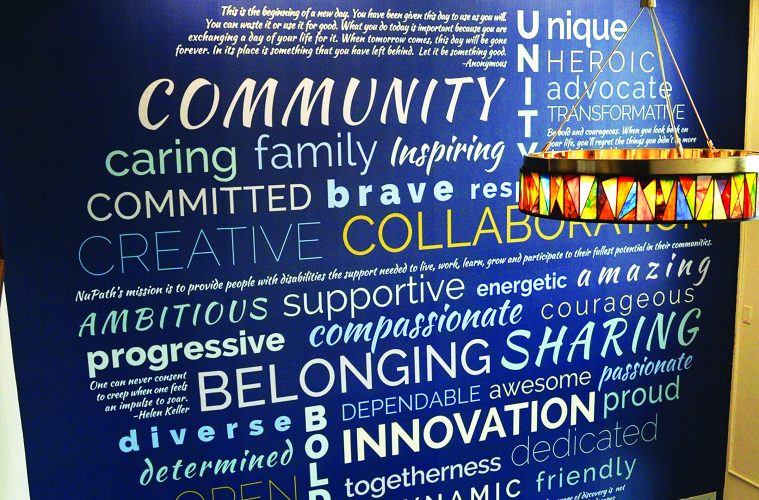Erik Canada walks through the aisles of Boston Appliance headquarters in Woburn, where he comes to work every Monday to Friday from 9:30 a.m. to 2 p.m. “This is my desk,” says the Woburn native as he points to his workstation, located against a wall in the business office. “I type labels, send letters, and crunch numbers.”
Does he have a favorite part? He looks thoughtful and ponders the question. No, he shakes his head. “I like it all.” He likes coming to work every day, taking part in the easy camaraderie of the workplace, and having a role in the functioning of a company, and he likes getting a regular paycheck at going wages.
The nonprofit organization that has made Eric’s job at Boston Appliance possible is NuPath, devoted to serving people with disabilities since 1968. With a network of support systems that include housing, transportation, autism programs, clinical services, day programming, and employment services, NuPath serves a population of just under 400 adults a day in several facilities. A day rehab program serves people with more severe physical disabilities, and 70 to 80 people live in various residential facilities. It is headquartered in Woburn.
“The world of people with disabilities is so changing right now,” says Daniel Harrison, president of NuPath. “We have come a long way from the days when we segregated people and labeled them with unkind words.”
He points out that in 2007 the organization changed its name from Central Middlesex Association for Retarded Citizens.
“We used to use the ‘R’ word, then we called them patients, then clients, and then consumers,” Harrison shakes his head. “I believe in ‘people first’ when it comes to language. These are people living with disabilities.
“We are all a product of the expectations and the opportunities we have been given,” he adds. “Even well-meaning people have, over the years, limited people with low expectations.”
Christian Jason, president of Boston Appliance, hired Erik Canada a year ago. “We treat him as an employee,” he responds, when asked whether management is tailored to Canada’s special needs. “We give praise when it’s due. If he’s not doing something right, we tell him, just as we would any employee.”
“Erik has grown so much, both in his job and as a person,” he adds. “He responds very positively to having a regular schedule, and is much more outgoing than he was when he first came to work here. In his job, he is of enormous value to the company.”
Harrison points out that the term disabilities covers a vast range, thus requiring NuPath to stitch together a quilt of services and support systems for individuals who range from high-functioning people who can use public transportation to severely disabled people, at the opposite end of the spectrum, who require intense support. In Canada’s case, a NuPath van brings him to and from work.
About 70 percent of the organization’s funding comes from the Commonwealth of Massachusetts. Medicaid provides some federal monies; the rest comes from fundraising and development. Canada’s employment represents the philosophical shift of recent years, explains Harrison.
“The goal is for people who have the ability to work in the community,” he says. “The goal is integration. We no longer isolate or segregate people. Everyone should be integrated—what varies is the level of support. We need to program to the level of people’s abilities.”
Until recently, the standard employment for people with disabilities was in sheltered workshops, where they would do piecework, usually at substandard wages. Beginning in 2011, the Civil Rights Division of the U.S. Department of Justice challenged the practice, stating that “hundreds of thousands of people with disabilities are being isolated and financially exploited by their employers.”
“We feel that sheltered workshops are a violation of human rights because of the segregation,” says Brett Reily, NuPath’s vice president of communications.
The last sheltered workshops in Massachusetts closed in 2013.
As part of their employment support services, NuPath holds an annual “Job Camp” that teaches interview skills, office procedures, how to identify and hone strengths, and how to dress for the workplace and keep to a schedule.
“These people are highly motivated to work,” Reily says. “And they have the lowest absentee rate of any population.” Jason agrees, adding that he plans to hire more graduates of NuPath’s Job Camp. “It’s good business; everyone benefits.”
Harrison explains the philosophical shift that guides his organization now. “We need to understand the nuance between taking care of someone and empowering them,” he says.
As Erik Canada looks to the future, he has a career goal. “Someday,” he says, “I would like to train someone else to do this job.”

